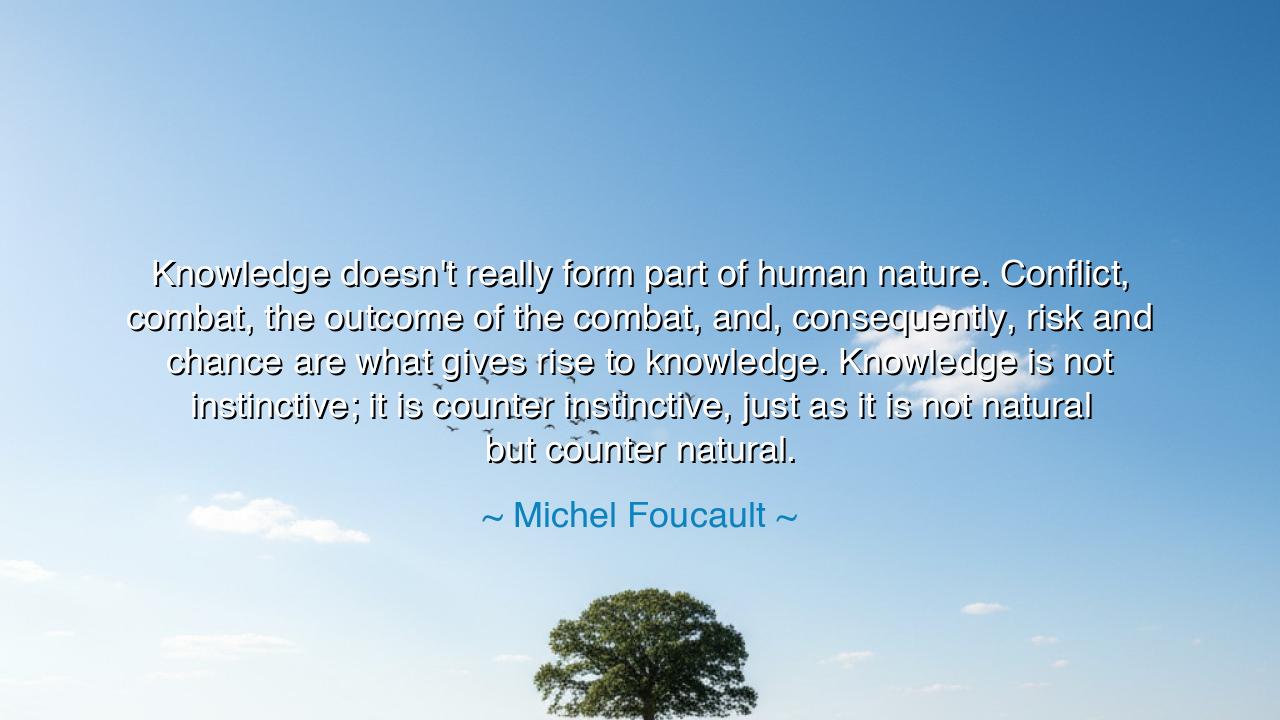
Knowledge doesn't really form part of human nature. Conflict
Knowledge doesn't really form part of human nature. Conflict, combat, the outcome of the combat, and, consequently, risk and chance are what gives rise to knowledge. Knowledge is not instinctive; it is counter instinctive, just as it is not natural but counter natural.






Host: The room was quiet, filled with a soft and reflective stillness, the light from the lamp casting gentle shadows across the space. Outside, the night had deepened, the world quieted, and the peaceful atmosphere settled between Jeeny and Jack. Jeeny sat at the table, her fingers lightly tracing the rim of her cup, absorbed in thought. Jack, standing near the window, gazed out at the darkened world, his mind clearly contemplating something deeper. The silence between them was filled with a quiet anticipation, as if a significant conversation was about to unfold.
Jeeny: (breaking the silence, her voice calm but reflective) “I came across something by Michel Foucault today that really made me think. He said, ‘Knowledge doesn’t really form part of human nature. Conflict, combat, the outcome of the combat, and, consequently, risk and chance are what gives rise to knowledge. Knowledge is not instinctive; it is counter instinctive, just as it is not natural but counter natural.’ What do you think about that?”
Jack: (pauses, his voice thoughtful) “That’s a challenging statement, isn’t it? Foucault is suggesting that knowledge doesn’t come from something inherent in us—it’s not something natural or instinctive. Instead, it’s born out of conflict, risk, and the unknown. Knowledge is the result of struggle, of overcoming obstacles or uncertainty, rather than being something we’re born with. It’s counter to what we might assume, that we’re born with certain natural knowledge, that we inherently know things. Foucault’s argument seems to be that knowledge arises from disruption, from questioning, from challenging the status quo.”
Jeeny: (nodding slowly) “Exactly. It’s almost like Foucault is saying that we don’t discover knowledge because it’s always been there within us or because we’re naturally inclined to it. Knowledge is created through experience, through engagement with the world in a dynamic way. It’s the result of conflict—whether that’s inner conflict, conflict with others, or external challenges. Risk, uncertainty, and struggle push us to think critically, to develop new ways of understanding the world around us.”
Host: The stillness in the room deepened as the conversation continued. Jack turned slightly toward Jeeny, his expression thoughtful as he considered the implications of Foucault’s statement. Outside, the world had quieted even more, but inside, their dialogue had turned inward, reflecting on the nature of knowledge, experience, and struggle.
Jack: (his voice quieter now, more reflective) “It’s interesting, isn’t it? The way Foucault frames knowledge as something that isn’t simply about understanding or awareness, but about challenging the world. Knowledge is not passive. It’s not something we simply acquire; it’s something we create through conflict, by stepping outside of our instincts or comfort zones. The process of gaining knowledge is often uncomfortable—it requires us to confront the unknown, to take risks, and to question what we know.”
Jeeny: (softly) “Yes, it’s about engagement rather than passive learning. Knowledge isn’t something that we absorb automatically. It’s something we have to earn, through active involvement, through experimentation and discovery. It’s the result of taking on challenges that force us to confront our assumptions, to see the world in a different way. The true value of knowledge comes when we push against our natural instincts and assumptions, when we step outside the comfortable and the familiar.”
Jack: (nodding slowly) “Exactly. It’s not just about acquiring facts or information—it’s about the process of making sense of the world, of trying to understand what we don’t know. The conflict and risk that Foucault talks about aren’t just obstacles—they’re opportunities. They demand that we evolve, adapt, and change our understanding. Knowledge doesn’t come from sitting back and waiting—it comes from diving in, from being willing to fail, to question, and to experience the unpredictable.”
Jeeny: (smiling gently) “Yes. And I think that’s why knowledge can be so transformative. It forces us to grow, to evolve, to see things from new perspectives. It’s not just about gaining information—it’s about expanding the way we think and understand. It’s a dynamic, ever-changing process that’s fueled by risk, uncertainty, and a willingness to face challenges head-on.”
Host: The quiet in the room felt more profound now, as if the conversation had reached a deeper understanding of the nature of knowledge and its connection to conflict, risk, and growth. Outside, the world had grown still, but inside, the room was filled with a shared insight about how we come to know the world—not through instinct, but through engagement, questioning, and the courage to face the unknown.
Jack: (smiling softly, his voice more assured) “It’s a reminder that knowledge isn’t something handed to us—it’s something we create through our experiences, our struggles, and our willingness to challenge ourselves. It’s in the fight against the unknown that we find the greatest insights.”
Jeeny: (nodding warmly) “Exactly. And when we embrace that process, we not only gain knowledge, but we transform ourselves in the process. Knowledge is a journey, not just a destination.”
Host: The world outside had quieted, but inside, the room was filled with understanding. Jeeny and Jack had uncovered a profound truth in Foucault’s words—that knowledge isn’t innate or passive. It’s created through the conflict, risk, and struggle that challenges our assumptions and forces us to grow. It’s in those moments of uncertainty and disruption that we gain the deepest insights and evolve into something more.






AAdministratorAdministrator
Welcome, honored guests. Please leave a comment, we will respond soon